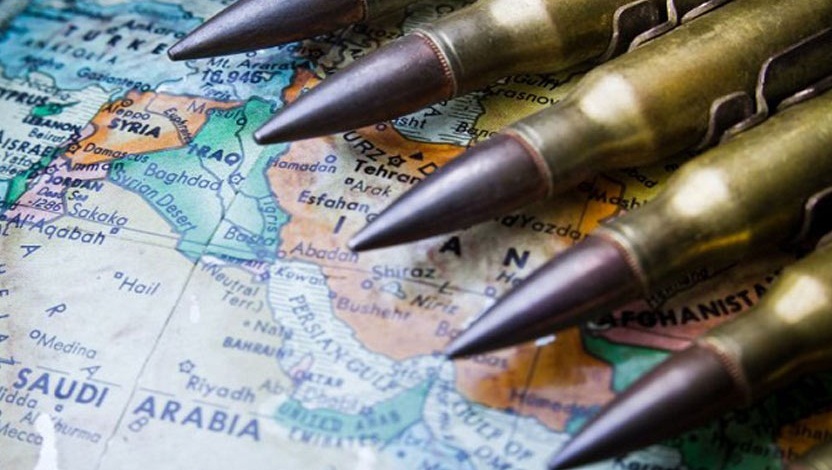
RNA - This is because the powers' profits from the divisions are not limited to building alliances and signing security pacts with the regional governments, rather they go beyond to include economic interests. A good example at the present time is the Iranophobic propaganda being promoted across the region, leading to increased arms race which makes the Arab countries the largest market of these powers' weapons, which are predominantly used to secure these powers' interests whenever necessary.
This atmosphere gives the powers good excuse to put as their policies' basis a set of approaches including inflaming the crises and highlighting the differences between the regional sides. Moreover, these powers push the allied regional governments toward adopting a securitized view with a great will to secure national interests through military power boost. Taking into account the developments underway in the region can help underscore the signs of further divergence, tensions intensification, and conflicts.
The sectarianism inflammation policy in various parts of the West Asia region including Iraq, Yemen, Afghanistan, Syria, and Turkey is an instrument used by the global powers to pursue their interests and at the same time expand their area of influence in competition with their rivals. Such a policy has immersed the region in the abyss of war, bloodshed, and carnage. This approach drives the analysts to blame the Western powers and their regional allies for playing a crucial role in creating and developing the takfirist groups that are now spreading across the region and inflicting resounding damages on a set of regional nations.
Take Taliban for instance which is the oldest militant group in the region. The group was created, trained, and equipped in the 1980s by the Pakistani spying agency Inter-Service Intelligence (ISI) with the US support. Comprised of a set of militant factions that opposed the Soviet Union’s Red Army deployment to Afghanistan, the group was to confront spread of Soviet communism and the revolutionary ideology of the Islamic Republic of Iran.
Other measures that contributed to spread of takfirist groups across the region were the US-led Western invasion of Afghanistan and Iraq between 2001 and 2003. These takfirist militant organizations managed to recruit fighters and raise money from the Muslim countries exploiting an atmosphere of hatred against the West after massacres in Afghanistan and Iraq that took place at the hand of the Western coalition. At the same time, disbanding the national army of Iraq upon the assault by the invading alliance led to a power vacuum in the country, something allowed the extremist groups to make the best of the opportunity to strengthen their capabilities there.
The Persian Gulf Arab states, topped by Saudi Arabia, bankrolled the takfirist groups to overthrow the pro-Iranian Syrian and Iraqi governments in a bid to cut the links between Iran and the resistant Palestinian and Lebanese movements. These Arab moves has been key to terrorism and extremism growth in the region.
But the Russian-Iranian bloc has recently risen in the face of terrorism widespread. The bloc has prioritized anti-terror fight and condemned the states' use of terrorist groups against other countries to seek their interests. By following the policy of fighting ISIS terrorists in Syria and Iraq, the Moscow-Tehran axis has managed to, to some extent, contain the effects of the devastating crisis.
Holding similar stances on the necessity of countering the transregional intervention in the sovereign states' domestic affairs, Russia and Iran decided that they need to expand military and political cooperation. Seeing the alliance has produced the desired results, Turkey, an actor that sustained security, financial, and political costs including the suicide attacks at home, hosting large numbers of refugees, and suffering a failed coup, in an open shift sought repairing ties with the Moscow-Tehran-Damascus camp, though the analysts still doubt that Ankara leaders are candidly getting along with the three-party anti-terror alliance.
Egypt, another regional power, has separated its way from Saudi Arabia, insisting on facilitation of regional stability and prioritization of anti-terror battle. The Lebanese political groups, who saw their country jeopardized as it was surrounded by neighboring countries with critical domestic conditions, after two years settled the political crisis by picking Michael Aoun as the president of the state.
These anti-terror actions, while some regional and international powers are still sowing sectarianism and terrorism in the region, have yielded indispensable outcomes, including pushing ISIS almost fully out of Iraq and plaguing the terrorist group in Syria.
This situation is promising but is certainly never enough, since many actors still seek their interests through terrorism to which they tie policy, security, and economy.
847/940
Source: Alwaght